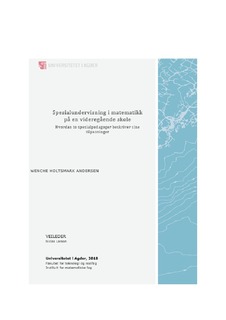| dc.contributor.author | Andersen, Wenche Holtsmark | |
| dc.date.accessioned | 2018-09-21T08:23:58Z | |
| dc.date.available | 2018-09-21T08:23:58Z | |
| dc.date.issued | 2018 | |
| dc.identifier.uri | http://hdl.handle.net/11250/2563824 | |
| dc.description | Masteroppgave matematikkdidaktikk MA502 – Universitetet i Agder 2018 | nb_NO |
| dc.description.abstract | The topic of this thesis is special education in mathematics at a secondary level emphasizing how two special educators describe the adaptations they make in their teaching. The students targeted by these special educators is both students in mathematics, entitled to special education under §5 of the Education Act, as well as low-performing students.in mathematics. My focus point is: How do two special educators in high school describe the adaptations they make in the classroom? The study thus includes how two special educators customize special education in mathematics for their students. The empirical starting point are descriptions by the two special educators of their work in a high school. I have chosen socio-cultural learning theories as a starting point for the theory of this assignment. I emphasize theories related to creating understanding in dialogue and learning communities. In addition, I have some theories showing the special educator role content and relevant changes in recent years.
I am using a qualitative methodology set, collecting data through semi-structured interviews with the two teachers. The interviews gave an insight into how the adaptations done by the special educators to adjust teaching and the background for their choice. I created an analysis tool, the framework taken from the main areas of the interview guide contained in the analysis tool. Then I put different parts from the theory of characteristics of mathematics teaching acting as sub-points. That way, data being analyzed from the theoretical framework described in the theory chapter.
The results of my study shows that the special educators are very keen to listen to the student when adapting the special education. They tell that close relationship with the student is imperative to succeed in reaching the student. The special educators are eager working for the student's goal of passing the exam. At the same time wanting the student to achieve useful mathematical skills. The educator says they will vary the outline, but always letting the student be part of the mathematical community within the class. Occasionally, students might be divided in smaller groups and joined with other students. These groups will not constitute low performing students only. Students having a good relationship, working well together with the students who strive or who have challenges. Occasionally, students can be separated, usually due to concentration problems. Specialists emphasize that it is important to be flexible and creative when special education is planned for. One special educator related to a student who received help in mathematics. When he was encouraged to influence the organization, he appreciated special education. Methods might vary, but dialogue is always an important basis for building mathematical understanding. The special educators emphasize that they make sure both they and other students act as scaffolders in the learning process. They also use the learning community by the students' contributions to construct meaning and understanding. One challenge the special educators point out is facing the student’s goal of passing the exam to get a diploma. This can sometimes be at the expense of spending time on mathematical competence providing relative understanding and usefulness in life. Another challenge they point out is to be aware of the students' needs and feelings about receiving special education in mathematics. There may be a dilemma giving the best possible help to increase the student's mathematical competence, versus providing students with a satisfactory education. Both specialists says that the student’s wishes and needs always being the main point. Not only mastering mathematics, they should also perform well in mathematics. A third challenge to the ordinary teaching make the starting-point. To plan for this is time-consuming, must be cooperated together with the math teacher. Specialists point out that having a good relationship with the general math teacher is very important for this to succeed. Another aspect is the extent to which the teacher has experience with low-grade students in mathematics and if they are used to working with a specialist teacher. This study has given me an insight into how two special educators adapt mathematics teaching. The results show that teaching has many of the elements that characterize effective mathematics education. The special educators want to adapt the teaching in a way that the students should participate in a learning community as much as possible. The challenges they are facing are largely related to cooperation with teachers. It is my wish that this study will help special education benefit students with increased participation and understanding in mathematics. | nb_NO |
| dc.language.iso | nob | nb_NO |
| dc.publisher | Universitetet i Agder ; University of Agder | nb_NO |
| dc.rights | Attribution-NonCommercial-NoDerivatives 4.0 Internasjonal | * |
| dc.rights.uri | http://creativecommons.org/licenses/by-nc-nd/4.0/deed.no | * |
| dc.subject | MA502 | nb_NO |
| dc.title | Spesialundervisning i matematikk på en videregående skole : hvordan to spesialpedagoger beskriver sine tilpasninger | nb_NO |
| dc.type | Master thesis | nb_NO |
| dc.subject.nsi | VDP::Samfunnsvitenskap: 200::Pedagogiske fag: 280::Spesialpedagogikk: 282 | nb_NO |
| dc.subject.nsi | VDP::Samfunnsvitenskap: 200::Pedagogiske fag: 280::Fagdidaktikk: 283 | nb_NO |
| dc.source.pagenumber | 91 s. | nb_NO |

